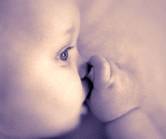
TUESDAY, Sept. 20 (HealthDay News) — Women with breast implants who think breast-feeding will change how their breasts look are less likely to nurse their babies successfully, according to a new study.
Researchers from the American Society of Plastic Surgeons (ASPS) pointed out that the number of pregnancies a woman has — not whether she breast-feeds — is what causes breasts to sag over time.
“If a woman believes that breast-feeding will adversely affect her breast appearance, she decreases her chances of successful breast-feeding,” study author Dr. Norma Cruz, said in an ASPS news release. “This misconception is unfortunate. Reassuring women that breast-feeding won’t harm their breast appearance, and that it has significant health advantages for both mother and baby, is vitally important.”
Researchers studied the breast-feeding habits of 160 mothers with breast implants. They found that 86 percent of the 97 mothers who failed at breast-feeding thought that it would make their breasts look worse. The researchers noted that this misconception had a direct impact on their success.
On the other hand, of the 63 women studied who exclusively breast-fed their babies for two weeks or more, only 13 percent believed it would harm how their breasts looked.
“It makes sense that breast augmentation patients would be concerned about the effect breast-feeding could have on the appearance of their breasts. After all, these women have invested both time and money into them,” said Cruz, an ASPS member surgeon. “However, available evidence tells us that although breasts sag more with each pregnancy, breast-feeding doesn’t seem to worsen these effects in women with or without breast implants.”
The findings are troubling, the researchers noted, because the U.S. Department of Health and Human Services Office on Women’s Health reports that not only does breast-feeding help strengthen the mother-child bond, it is linked to a number of health benefits for women, including lower risk of type 2 diabetes, breast cancer, ovarian cancer and post-partum depression. The agency adds that breast milk also helps children build their immune systems and fight diseases.
“Now that we know breast augmentation patients’ views on how breast-feeding will impact the look of their breasts, patient education becomes critical to improving perceptions and strengthening the health and lives of both mother and child,” concluded Cruz.
The study was slated to be presented at the American Society of Plastic Surgeons’ annual conference in Denver. The data and conclusions should be viewed as preliminary until published in a peer-reviewed journal.
More information
The U.S. National Library of Medicine provides more information on breast-feeding.

